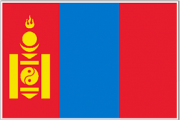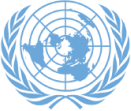MONGOLIA AND THE UNITED NATIONS
Small countries like Mongolia, the international organizations, in particular the United Nations, play a pivotal role with regards to protecting their national interests through the political and diplomatic means, communicating their prospects and voice concerning the issues on the global agenda as well as making progress in the development path. Therefore, the position multilateral cooperation occupies in and contribution it makes to the achievement of Mongolia’s foreign policy goals has been increasing.
Since its fully-fledged membership on October 27 1961, Mongolia has been an active member of the UN participating and contributing to its activities and purposes. With the UN membership Mongolia ensured its independence and sovereignty, safeguarded its security and strengthened its position in the international community. The UN supported efforts of Mongolia in its socio-economic development, environment protection, democracy promotion and human rights. In this way Mongolia benefited significantly from its UN membership and multilateral cooperation.
Mongolia participated and committed itself to the implementation of the decisions from the UN major conferences and summits, which took since 2000, on children, financing for development and transit cooperation of landlocked developing countries.
Mongolia initiated more than 70 resolutions in the General Assembly, of which 10 were adopted in the past five years. General Assembly resolutions on “UN Literacy Decade (2003-2012),” “Support by the UN system of the efforts of Governments to promote and consolidate new and restored democracies,” “Improvement of the situation of women in rural areas,” “Cooperatives in social development” request UN and its system organizations as well as Member States to take concrete steps towards resolving issues raised in the above resolutions.
Mongolia is active in the following concrete areas: Mongolia’s international security, UN peacekeeping operations, socio-economic development, addressing special needs of landlocked developing countries.
Mongolia’s International Security
As a result of Mongolia’s concerted action, the UN General Assembly adopted resolution 53/77 (D) on "Mongolia's international security and nuclear-weapon-free status" at its 53rd session in 1998. Seeking to institutionalize the status at the national level in line with the GA resolution, the State Great Hural (Mongolian Parliament) adopted in February 2000 the Law on Mongolia’s Nuclear-Weapon-Free Status and Resolution №19 on Measures Pursuant to the Law.
This was followed by the GA adopting, in addition to the above-mentioned resolution, resolutions that recognized Mongolia’s nuclear-weapon-free status and aimed to consolidate it in 2000, 2002 and 2004, respectively. In parallel, UN Secretary-General reported to the GA on the implementation of the resolution in 2000, 2002 and 2004, respectively.
Economy and Sustainable Development
Implementing Millennium Development Goals adopted at the United Nations Millennium Summit in 2000, at the national level has been a priority objective for the Government of Mongolia. The Government launched the first report on the implementation of the national MDGs in 2004. The Parliament of Mongolia adopted a resolution endorsing the national MDGs in April, 2005 at its spring session. The resolution identified measurable and time bound targets and endorsed the additional 9th goal with the provision of strengthening human rights and fostering democratic governance. The resolution also calls upon the Government to align the national MDGs into the country’s development programs and plans and reflect related costs for implementing MDGs in its budgeting, and report the implementation status to the parliament every two years.
Indicating the country’s eagerness to transition to a sustainable development model and a low carbon economy the Parliament of Mongolia adopted a Green Development Policy in 2014. It has created awareness of the potential for enhancing low-emission and climate–resilient principles for future economic growth in Mongolia and supports the Government’s efforts to shape its priorities for green growth and the Post 2015 development framework.
Mongolia, a landlocked developing country has been an active partner within the United Nations system in the issues concerning the above mentioned group of countries. A draft resolution on “Specific actions related to the particular needs and problems of landlocked developing countries” submitted by Mongolia on its own initiative to the UN General Assembly at its 54th session was adopted with the support from the Group of 77.
Mongolia is closely cooperating with the United Nations agencies such as United Nations Environmental Program in ensuring the country’s sustainable development and environmental protection. In 2003 the Government of Mongolia and United Nations Environmental Program signed the Framework Agreement for Partnership in which UNEP offered an assistance of approximately US$500,000 to Mongolia. The Government of Mongolia adopted the National Program on Protection of Ozone Layer in 1999.
Human Rights and Civil Society
Provision of human rights became one of the indicators for identifying the prestige of certain country at the international level. In the human rights area, Mongolia is guided by the principles of its Constitution and international human rights instruments, in particular Human Rights Declaration, Political and Civil Rights Pact, Economic, Social and Cultural Rights Pact, and other multilateral treaties and agreements. As the obligation under the international treaties and conventions, Mongolia prepares its national reports on the implementation and submits to the relevant human rights committees for a review.
Besides, Mongolia fruitfully cooperates with the relevant UN agencies through receiving professional advice and technical assistance in optimizing its national legislation in compliance with the international treaties and conventions, preparing human resource for the courts, police and other law enforcement agencies and building national capacity to truly guarantee human rights. In addition, with the aim to increase public awareness on and advocate the human rights international instruments “Legislative implementation of the universal human rights instruments” conference was organized in collaboration with the local institutions mandated to provide human rights.
In maintaining cooperation with the relevant UN programmes and funds in the area of human rights, Mongolia gives a high priority to the issues of children and child rights protection, and population development. Within the frame of the current programme of cooperation (2002-2006) between the Government of Mongolia and UNICEF our country is receiving technical and professional assistance equivalent to 11.3 million USD.
UNESCO and Mongolia
Our country has cooperated with UNESCO through the active participation in its activities. In accordance with the principles of Memorandum of Understanding signed in 2002 between the Government of Mongolia and UNESCO, Mongolian traditional long song /urtiin duu/ was proclaimed as the masterpiece of the oral and intangible cultural heritage of humanity in 2005.
Mongolia attaches a large significance to the universal effort to eradicate illiteracy and promote Education For All. Mongolia has initiated the UN literacy decade that was endorsed by the General Assembly.
Mongolia’s Participation in UN Peacekeeping Operations
Mongolia gives a priority to preventive diplomacy measures and supports United Nations peacekeeping operations. in 1996, Mongolia expressed its intention to contribute to the UN peacekeeping operations and in 1999 signed with the United Nations a Memorandum of Understanding Concerning Contributions to the United Nations Standby Arrangements. In 2002, a “Law on participation of Military and Police personnel in the United Nations peacekeeping operations and other international operations” was adopted. Since that time, Mongolia has been sending military observers to the United Nations peacekeeping operations.
As of today, 18 Mongolians served as military observers in the United Nations peacekeeping operations in the Democratic Republic of the Congo, Western Sahara and Sudan. Officers of the Mongolian Armed Forces have completed international training courses on peacekeeping. We also organized peacekeeping operations field training exercises in cooperation with more than 10 countries.
UN Reform
Reform and stregnthening of the United Nations has become major concern of its Member States. Emphasizing central role of the UN in the multilateral system, Mongolia consistently supported UN reform to adapt it to the needs of the 21st century with a view to enhancing its efficiency and cappacity to effectively address full range of challenges of our time.
Reform of the Security Council is an essetnial element of the overall effort to reform the UN. Mongolia’s principled position on the Security Council is a just and equitable enlargement by increasing the number of permanent and non-permanent seats and ensuring proper representation of both developing and developed countries; enhanced openness and transparency of its activities; democratization of its working methods; and review of veto power with a view of its gradual curtailing. The reform of the Security Council should result in enhanced implementation and effectiveness of its decisions and broadly represented membership by all Member States of the UN. We would support a proposal that would gather widest possible backing from the Member States. On many occasion, Mongolia supported aspirations of Germany, India and Japan to become permanent members of the Security Council. In addition, we view that Latin America and Africa should have their appropriate representation in the expanded and reformed Security Council.
Mongolia and major groups in the UN
Mongolia has been promoting friendly relations with developing countries and cooperating with them in achieving common goals within the framework of the Non-Aligned Movement, the Group of 77 and China and the Group of Landlocked Developing Countries. The Non-Aligned Movement (NAM) is central mechanism for political cooperation representing and safeguarding interests of its 116 developing member countries. Today the NAM is still relevant and practical for providing avenues for South-South and North-South cooperation addressing common concerns of members of the NAM. We view that Mongolia’s participation in the Movement contributes to safeguarding its independent foreign policy and strengthening its position at the world stage.
Adhering to purposes and principles of the NAM, Mongolia supports and cooperates with other member countries in strengthening the Movement’s role in the international relations. We value the NAM, which has been an important instrument for advancing Mongolia’s foreign policy objectives. The NAM member countries consistently supported strengthening Mongolia’s nuclear weapon free status and addressing special needs of landlocked developing countries in the final documents of the NAM summits and conferences.


